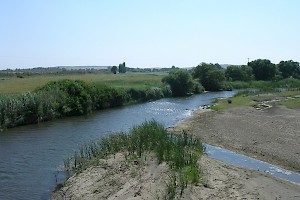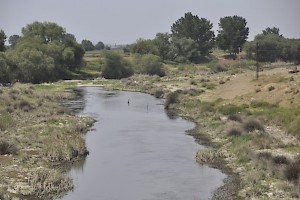Scamander (Karamenderes)
Q19309185
The Scamander, the modern Menderes Suyu, is not a very large river, but it has become famous because it is frequently mentioned in Homer's Iliad. The epic poet mentions that the Scamander had deep swirls, was flowing smoothly, and was by the gods called Xanthus ("the blond one").note

This latter epithet used to be a common way to describe rivers: for example, the Romans often called the Tiber flavus and one of the tributaries of the Rhine was the Albula. Nevertheless, the philosopher Aristotle felt the need to explain the title: the Scamander had the reputation of making lambs blond.note
The river god, who was believed to be the son of Zeus, received sacrifices from the Trojans, who had appointed a priest.note In the war, he supported his people. Book 21 of the Iliad is entirely devoted to Achilles' murderous fight against the Trojans in the river, which results in the god's request to continue the struggle somewhere else because there were too many dead bodies within his waters.note Although Achilles wants to do this, he still has to cross the river, and the river god attacks him. Already in Antiquity, it was pointed out that it was a bit strange that the river god could be presented as speaking from beneath his flood.note

The source of the Scamander river was in the Ida mountains, but there were also two wells near the walls of Troy, one hot and one cold.note This has not been confirmed by modern research.note Nor is there confirmation that the Scamander united itself with the Simoeis.note
According to Apollodorus, the river god was married to a nymph called Idaea; Teucer, the ancestor of the Trojan dynasty, was their son.note Dionysius of Halicarnassus records a daughter Callirhoe, who married to Erichthonius and gave birth to a son named Tros.note
The Scamander was, as we already noted, a small river, and it comes as no surprise that it was insufficient to supply drinking water to the army of the Persian king Xerxes, who invaded Greece in 480 BCE and spent some time at the plain of Troy.note